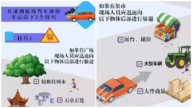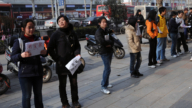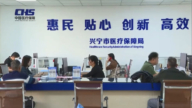【新唐人2012年12月03日訊】中共10年前的十六大報告說,不能放任社會貧富差距繼續拉大,這個「豪言壯語」言猶在耳,然而10年後的今天,中國社會貧富懸殊更加嚴重。日前,香港媒體披露一份中共內部的秘密報告,指稱中國的「基尼係數」已經突破危機的臨界點,社會隨時會爆發規模性動亂。請看以下報導:
國際上廣泛認同和普遍採用「基尼係數」來衡量貧富差異程度,通常把0.4作為收入分配差距的「警戒線」。
由於中共當局從來沒有對外正式公布中國的「基尼係數」,社會上流傳的數據,基本都是由學者研究統計得出。不過中國的基尼係數早就超過0.4的警戒線,並且逐年攀升,是各界普遍認同的說法。
日前,香港《爭鳴》雜誌11月號文章披露了一份社會調查報告,這份題為《關於社會穩定、和諧狀況調查研究》的內部報告指出,2012年上半年,中國的「基尼係數」持續上升到0.613,已經突破危機臨界點,社會各種不穩定風險加劇,矛盾升溫、激化,隨時會爆發規模性動亂。
美國「南卡羅萊納大學」艾肯商學院教授謝田表示,世界上貧富懸殊最大的國家是南非,基尼係數也只有0.7左右,這是由於「種族隔閡和對立」所造成的。然而在沒有種族問題的情況下,中國的「基尼係數」仍然居高,令人震驚。
美「南卡羅萊納大學」艾肯商學院教授 謝田:「最近一兩年中國大陸的貧富懸殊越來越大,民眾的不滿情緒也越來越大,中共官員的強取豪奪、貪污腐敗也越來越嚴重,所以這個指數突破0.6向0.7邁進也是可以預計的。」
報告還列出了多組考察調研數據,證明社會貧富懸殊已經突破危機臨界點。
其中,以2011年地區黨政、國家機關公職人員和當地普通職工平均年收入為例,省級(包括副省級)公職人員的平均年收入是普通職工的15倍到38倍﹔連差距最小的普通公職人員年收入也達到當地職工的6倍到12倍之多。
然而,這組統計數據還沒有包括公職人員的休假旅遊、物資免費派送和家屬享有的待遇等其他「隱性收入」。
中國經濟學家 簡天倫博士:「社會動亂其實早就在兩極分化的情況下,還有其他社會不公引起的民憤很大。我完全相信基尼指數的預測,可能比那更高都有可能。其實誰都知道,不需要他測都知道中國的兩極分化特別嚴重。」
報告指出,群體規模性抗爭、遊行、請願等事件,每年以20%的速度增長﹔從「反對官場腐敗」、「民眾權益受到侵害」,提升到還權於民、還政於民的「維權、維憲」公民運動。而這些抗爭得到了社會各階層不同程度的支持、認同和同情。
報告批評地方官員在看到本地區問題的嚴重性和政治危機後,產生了某種程度的憂慮和緊張,但在應對、處理過程中卻抱著「再等一等、看一看」的心態,顯示出缺乏承擔的表現。
報告還認為,當前通過營造聲勢、採取「高壓」手段來控制官民矛盾衝突,大陸民眾對當局的期待和信任度,已經對中共政權敲響喪鐘。
謝田:「不光是基尼指數所代表的經濟上財富上的差距,從政治上的,社會上的,所有的指標都指向了一點,就是中共的統治會出現土崩瓦解的狀態。」
《爭鳴》文章也引述了北京政情分析人士的話說,所謂的「改革開放三十年」的確給中共權貴階層帶來了巨大利益,然而廣大中國民眾付出了辛勞後,卻沒有從中分享到應有的福利。「基尼係數」的警訊正顯示出中共政權的岌岌可危。
採訪/易如 編輯/李明飛 後製/王明宇
Riots Could Occur at Any Time: Confidential CCP Report Discloses Huge Gap between the Rich and Poor
During the Chinese Communist Party’s (CCP) 16th National
Congress ten years ago,
it was discussed that the gap between
the wealthy and the poor will be reduced.
Ten years later, and this gap has becoming increasingly stark.
Recently, Hong Kong media disclosed
an internal CCP confidential report.
It stated that China’s Gini Coefficient, a statistical
measure of inequality, has passed the critical point.
At this point, a level of rioting is expected to take
place in societ, and the CCP regime is collapsing soon.
The Gini coefficient is widely used to calibrate
the gap between the wealthy and the poor.
Usually a value of 0.4 is used as the warning
line for the gap in distribution of incomes.
However, the CCP regime has never
publicized China’s Gini coefficient.
The Gini coefficient of China that people discuss
is actually a statistical number calculated by scholars.
China’s Gini Coefficient passed the warning line
a long time ago, and it keeps increasing every year.
This fact is widely agreed in China.
Hong Kong’s “Zheng Ming” magazine published an article
in November, disclosing a social investigative report.
The article was entitled, “An Investigation
on Social Stability and Harmony”.
It stated that China’s Gini coefficient increased
to 0.613 during the first half of 2012.
This has broken through the critical point.
All kinds of social instability risk have aggravated.
Social conflicts have intensified, and
a level of turmoil can take place any time.
Xie Tian, Professor at the Aiken Business School
at the University of South Carolina, commented.
South Africa has the biggest gap between wealthy and poor.
However, the Gini Coefficient for South Africa is only 0.7,
which is mainly caused by racial antagonism.
However, there is no racial antagonism in China, and
astonishing that China has such a big Gini coefficient.
Xie Tian: “In the past one or two years, the gap between
the wealthy and poor has become bigger and bigger.
People’s discontentment keeps growing.
Corruption of CCP, and the seizing of wealth
by force, is becoming more and more rampant.
Therefore, there is no surprise that China’s
Gini coefficient is getting close to 0.7.”
報告還列出了多組考察調研數據,證明社會貧富懸殊已經突破危機臨界點。
The “Zheng Ming” report listed several groups of data.
This demonstrated that the gap between the wealthy
and poor in China has broken through to a critical point.
As an example, compare the annual income for party
administration, State personnel and local ordinary workers.
The average annual income for a state official
is 15 to 38 times that of an ordinary worker.
Even the annual income of state personnel at the lowest
structure level is 6 to 12 times that of local ordinary workers.
In addition, this income data does not include
“grey income”, such as paid-time vacation, free goods and other benefits to employee families.
China Economist Jiang Tianlun: “Social riots usually take
place when the wealthy and the poor are polarized.
Other social injustices also causes great discontent.
I totally believe in the prediction on China’s Gini coefficient.
Actually, we all know that the polarization between
the rich and the poor is very severe in China.”
The report stated that all occurrences of resistance,
parades and petition have increase 20% every year.
This includes 『anti-Corruption』 and human rights petitions.
Now it has increased in scale to citizen
movements, returning power to the people.
These movements gained support, agreement
and sympathy from people of all levels of society.
The report criticized local officials for holding the attitude
of 『wait and see』, when dealing with local political crises.
It shows that they are lacking in responsibility.
The report also stated that the CCP now deals with conflicts
through making empty shows of strength or “high pressure".
The loss of trust and hope in the CCP regime
has already knelled its funeral bell.
Xie Tian: “Not only does the Gini Coefficient indicate
that the CCP regime is going to collapse soon.
It is also demonstrated by political, social and other indices.”
The article from “Zheng Ming” also quoted words
from analysts on Beijing’s political situation.
It stated that the so-called “30 years of reform
and opening up” did once bring huge profit to the rich, and power in the CCP structure.
However, ordinary people have obtained what
they deserve after they make the effort.
The Gini coefficient shows that the CCP regime
is in imminent danger of falling down.




























